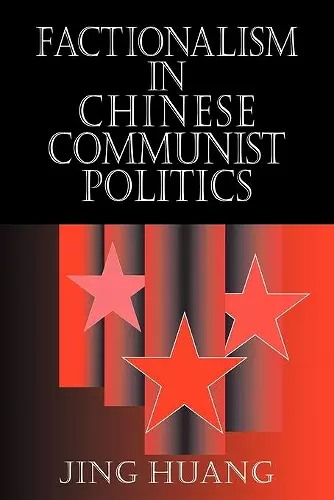Factionalism in Chinese Communist Politics
Format:Paperback
Publisher:Cambridge University Press
Published:23rd Nov '06
Currently unavailable, and unfortunately no date known when it will be back
This paperback is available in another edition too:
- Hardback£125.00(9780521622844)

In this book, first published in 2000, Jing Huang examines factionalism's role in leadership relations and policy-making in Chinese communist politics.
Factionalism is widely understood to be a distinguishing characteristic of Chinese politics. In this book, first published in 2000, Jing Huang examines the role of factionalism in leadership relations and policy-making. His detailed knowledge of intra-party politics offers an alternative understanding of still-disputed struggles behind the high walls of leadership in Zhongnanhai.Factionalism is widely understood to be a distinguishing characteristic of Chinese politics. In this book, first published in 2000, Jing Huang examines the role of factionalism in leadership relations and policy-making. His detailed knowledge of intra-party politics offers an alternative understanding of still-disputed struggles behind the high walls of leadership in Zhongnanhai. Huang traces the development of factional politics from its roots in the 'mountaintops' and the enduring impact of the personal bonds formed between Mao and his supporters at the Yan'an Round Table. Critiquing the predominant theories on leadership and decision-making, he explains that it is not power struggles that give rise to factionalism, but rather the existence of 'factionalism that turns power into an overriding goal in CCP politics'. Huang explains why policy outcomes switched constantly between 'Left-adventurism' and 'Right-conservatism' under Mao's reign and between 'emancipation of mind' and 'socialist spiritual civilization' in the Deng era.
'… a fascinating book.' The Journal of Politics
'A highly original and insightful analysis which debunks many conventional wisdoms about FDI 's role in China's development. Huang demonstrates why a substantial part of the colossal FDI inflows since the early 1990s is more readily explained by deficiencies in China's institutions and domestic financial intermediation, than by the attractiveness of its investment regime. He points out that much FDI went into traditional labor-intensive industries in China, often sidelining private domestic entrepreneurs. He also shows how FDI influenced China's broader reform strategy and process in positive ways. Indispensable reading for the serious student of China's economic transition.' Pieter Bottelier, former representative of the World Bank in China and adjunct lecturer at Kennedy School of Government, Harvard University
'Huang's level of detail and ability to investigate 'sensitive' issues is unrivalled; … there is no denying the richness of evidence that this volume presents. It is a star example of the ability that now exists for 'normalizing' CCP political history through knowledge and refinement of interpretation. Jing Huang's book not only presents us with a new way of looking at conflicts within Chinese Communism, but also, and perhaps more importantly, shows younger scholars how the patient attention to facts may crack what may once seemed the most impenetrable of historical vaults.' Journal of Cold War History
ISBN: 9780521032582
Dimensions: 228mm x 151mm x 27mm
Weight: 710g
480 pages